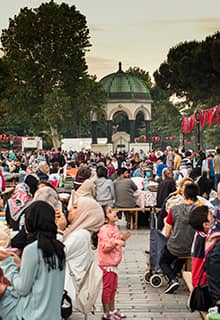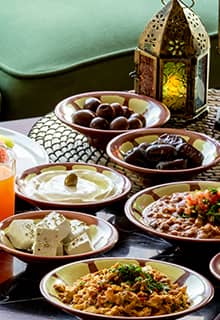

Kurban Bayramı (Feast of the Sacrifice) and Ramazan Bayramı (Ramadan Feast)
Feasts arrive according to the lunar Hijri Calendar, which is 11 days shorter than the common solar (Gregorian) calendar. Kurban Bayramı (Feast of Sacrifice) and Ramazan Bayramı (Ramadan Feast) are national public holidays in Türkiye. They may affect your travel plans, so you should know when they occur and how they affect travel.
Feasts begin at sunset and last until sunset on the following calendar day. The important public holidays are usually preceded by a half-day public holiday called arife (preparation). Offices, banks, and businesses may close at noon on the day of arife, with the festivities beginning at sunset.
Ramadan and Ramadan Feast (Eid al-Fitr)
In Türkiye, nationwide celebrated holidays are referred to as bayrams (feasts), and Eid al-Fitr is referred to as Ramazan Bayramı (Ramadan Feast). It is a time for people to attend prayer services, put on their best clothes, visit all their loved ones, and pay their respects to the deceased with organized visits to cemeteries.
Feast of Sacrifice (Eid el-Adha or Eid el-Kebir)
Feast of Sacrifice is the most important Islamic religious festival of the year. It is a 4- or 5-day public holiday in Türkiye.
Kandils
A kandil refers to five Islamic holy nights, celebrated in Türkiye and Muslim Balkan communities and related to the life of Prophet Muhammad (PBUH). During kandils, the minarets are illuminated and special prayers are made, a tradition that dates back to the Ottoman Sultan Selim II in the 16th century.
Kandils (Mawlid al-Nabi, Laylat al-Raghaib, Lailat al Miraj, Mid-Sha’ban, and Laylat-al Qadr) and the Day of Ashure are not public holidays, but mosques are illuminated, special foods and treats are prepared, and you can participate, actively or passively, in the celebrations.








